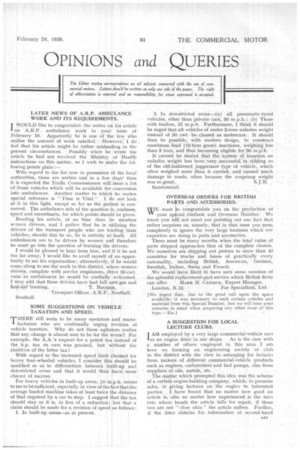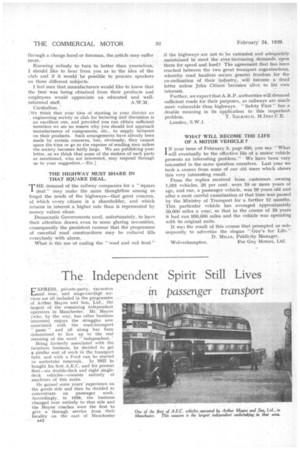OPINIONS and QUERIES The Editor invites correspondence on al . .1 subjects
Page 83

Page 84

If you've noticed an error in this article please click here to report it so we can fix it.
connected with the use of commercial motors. 1...tterfi shoug he written on only one side of the paper. The right of abbreviation is reserved and no responsibility. for views expressed is accepted.
LATER NEWS•OF A.R,P. AMBULANCE WORK AND ITS REQUIREMENTS.
I WOULD like to congratulate the writer on his article
on A.R.P.. ambulance work in your issue ofFebruary 10. Apparently he is one of the few. who realize the amount of work entailed. However, I do feel that his article might be rather misleading in the present circumstances. . Possibly when he wrote the article he had not received the Ministry of Health
• instructions on this matter, so I wish to make the fol lowing points plain:— •
With regard to the list now in possession of the local authorities, these are useless and in a few days' time it is expected the Traffic Commissioners will issue a list of those vehicles which will be available for conversion into ambulances. Another matter to which he makes special reference is "Time is Vital." I do not look at it in this light, except so far as the patient is concerned. The ambulance side of the question is, coolness, speed and smoothne.S.s, for which points should be given.
Reading his article, at no time does he mention women drivers, and I gather that he is utilizing the drivers of the transport people who are lending their vehicles ; should this be so, he is entirely at fault All ambulances are to be driven by women and therefore he must go into the question of training the drivers.
I would be pleased to hear from him, and if it be not too far away, I Would like to avail myself of an opportunity to see his organization; alternatively, if he would come along to see the work in this district, where women drivers, complete with service respirators, drive 3()-cwt. vans as ambulances he would be cordially welcomed. I may add that these drivers have had full anti-gas and
first-aid "training. . . T. BOURKE., Transport Officer, A.R.P., Southall. Southall.
SOME SUGGESTIONS ON VEHICLE TAXATION AND SPEED.
THERE still seem to be many operators and manu
facturers who are continually urging revision of vehicle taxation. Why do not these agitators realize that any change is almost sure to be for the worse? For example, the A.A.'s request for a petrol tax instead of the h.p. tax On cars was granted, but without the abolifcn of the latter tax!
With regard to the increased speed limit clairaed for heavy four-wheeled vehicles, I consider this should he modified so as to differentiate between built-up and derestricted areas and that it would then have more chance of success.
For heavy vehicles in built-up areas, 20 m.p.h seems to me to be sufficient, especially in view of the fact that the average loaded machine takes at least twice the distance of that required by a car to stop. I suggest that the tax should stay as it is, in lieu of a reduction ; but th t a claim should be made for a revision of speed as folio s 1, In built-up areas—as at present.
2. In derestricted areas—(a) all pneumatic-tyred vehicles, other than private cars, 30 m.p.h.; (b) Those with trailers, 25 m.p.h. Furthermore, I think it should be urged that all vehicles of under 3-tons unladen weight instead of 50 cwt, be classed as motorcars. It should then be possible, with modem design, to .construct maximum load (12-tons gross.. machines, weighing less than 3 thns, and thus becoming eligible for 30 m.p.h.
It cannot be denied that the system of taxation on unladen weight has beensvery_successful in ridding us of the oId-fashioned juggernaut type of vehicle, which often weighed more than it carried, and caused much damage to roads, often because the unsprung weight was so great. S. J .13 . Sanderstead.
OVERSEAS ORDERS I-OR BRITISH PARTS AND ACCESSORIES.'
WE want Ito congratulate you on the production of " your spicial Outlook and Overseas Nuinher. We know you will not mind our pointing out one fact that rather surprises us, namely, that in that issue you seem completely to ignore the very large business which our exporters are doing in parts and accesscries.
There must be many months when the total value ot parts shipped approaches that of the complete chassis. We ourselves are shipping out pistons to more than 40 countries for trucks and buses of practically every nationality, including British, American, German, Swedish, Italian, Swiss and French.
We would have liked, to have seen stime mention of the splendid repIacementTa.rt service which British firms can offer. MARK M. CANSICK, Export Manager, London, N.12. For Specialloid, Ltd.
We regret that, due to the e great call upon the space available, it was necessary to omit certain articles and material from this Special Number, but we will hear. your remarks in mind when preparing any other issue of this type—ED.] A SUGGESTION FOR LOCAL LECTURE CLUBS.
IAM employed by a very large commercial-vehicle user as an engine fitter in our shops. As is the case with a number of others employed in this area I am keen on forming an engineering society or club in the district with the view to arranging for lectures from makers of different commercial-vehicle products such as engines, carburetters'and -fuel pumps, also from suppliers of oils, metals, etc.
The matter which prompted this idea was the Scheme of a certain engine building company, which, to promote sales, is giving lectures on the engine to interested parties. I have found that no matter how good an article is, also no niatter how experienced is the man into whose hands the article falls for repair, if these two are not " close, akin " the article suffers. Further, if the fitter obtains his information at second-hand through a charge hand or foreman, the article may suffer more.
Knowing nobody to turn to better than yourselves, I should like to hear from you as to the idea of the club and if it would be possible to procure speakers on these different subjects.
I feel sure that manufacturers would like to know that the hest was being obtained from their products and employers would appreciate an educated and well informed staff. A.W.M. Carshalton. '
[We think that your idea of starting in your district an engineering society or club for lecturing and discuSsion is an excellent one, and provided you can obtain sufficient members we see no reason why you should hot approach manufacturers of components, etc., to supply lecturers on their products. Such arrangements have already been made by certain concerns, but, obviously, they cannot spare the time or go to the expense of sending men unless the society becomes fairly large. We are publishing your letter, as we think that some of the makers of such parts as mentioned, who are interested, may respond through us to your suggestion.—En.]
THE HIGHWAY MUST SHARE IN THAT SQUARE DEAL.
THE demand of the railway companies for a "square
deal" may make the more thoughtless among us forget the needs of the highways—that great concern, of which every citizen is a shareholder, and which returns in interest a higher rate than is represented by money values alone.
Democratic Governments need, unfortunately, to have their attention drawn even to some glaring necessities, consequently the persistent rumour that the programme of essential road constructions may be reduced fills everybody with alarm.
What is the use of ending the "road and rail feud"
if the highways are not to be extended and adequately maintained to meet the ever-increasing demands upon them for speed and load? The agreement that has been reached between the two great transport organizations, whereby road hauliers secure greater freedom for the co-ordination of their industry, will become a dead letter unless John Citizen becomes alive to his own interests.
Further, we expect that A.R.P. authorities will demand sufficient roads for their purposes, as railways are much more vulnerable than highways. "Safety First" has a double meaning in its application to this important problem. T. SALKIELD, M.INST.C.E. London, S.W.1.
WHAT WILL BECOME THE LIFE OF A MOTOR VEHICLE?
INyour issue of February 3, page 830, you say "What will eventually be the effective life of a motor vehicle presents an interesting problem." We have been very interested in the same question ourselves. Last year we took a census from. some of our old users which shows this very interesting result.
From the replies received from customers owning 1,091 vehicles, 26 per cent. were 10 or more years of age, and one, a passenger vehicle, was 19 years old and after a most careful examination at that time was passed by the Ministry of Transport for a further 12 months. This particular vehicle has averaged approximately 50,000 miles a year, so that in the course of 19 years it had run 950,000 miles and the Vehicle was operating with its original units.
It was the result of this census that prompted us subsequently to advertise the slogan "Guy's for Life." . D. Maas, Publicity Manager, Wolverhampton. For Guy Motors, Ltd.












































































































































